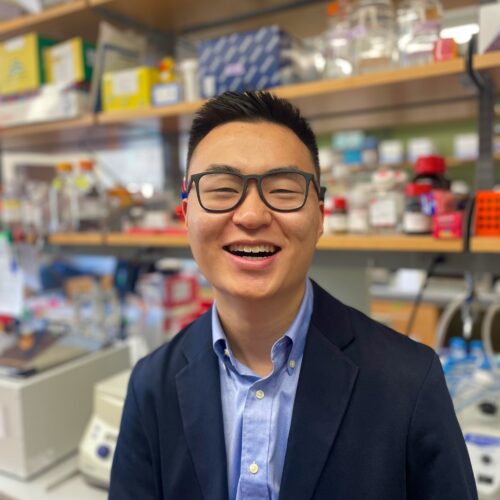Photo courtesy of Sophia Li.
Eric Sun (MY ’23) is a lot of things: aspiring physician-scientist, cancer biology researcher, competitive yo-yo player, long-distance runner, and most recently—a 2022 Barry Goldwater Scholar. Double majoring in Molecular Biophysics and Biochemistry (MB&B) and Statistics and Data Science (S&DS), Eric dedicates his time outside the classroom to researching and understanding cancer drug resistance, with previous work in epigenetics and DNA damage.
Growing up in northern Virginia, Eric was always excited by the proximity of the National Institute of Health in Maryland. “You see experiments in the textbook, and you’re like – how do you actually do that?” Eric said.
At sixteen years old, Eric cold-emailed NIH principal investigators hoping for a summer laboratory experience and ultimately joined Philipp Oberdoerffer and Mirit Aladjem’s labs, where he spent the next two years. There, he studied the epigenetics behind the DNA damage response, primarily how different types and modifications of histones (which are what DNA wraps around in the cell’s nucleus) could dictate or inform the environment in which DNA repair processes occur.
He continued pursuing this interest in epigenetics at Yale, where he joined Andrew Xiao’s lab in the fall of 2019 as a first-year. “I felt that the projects that were ongoing were really fascinating, and there was great mentorship from the MD/PhD students in the lab that have helped me tremendously through the last couple years, especially navigating the pathway of applying for an MD/PhD,” Eric said.
Despite initial setbacks due to COVID-19, Eric’s work on cancer drug resistance—specifically targeted therapies in the context of lung adenocarcinoma—has made great progress. He focuses on epidermal growth factor receptor (EGFR) mutant lung adenocarcinoma, a subclass of non-small cell lung cancers, and how these cancers ultimately develop resistance against therapies that are initially greatly effective.
Currently, in the clinic, patients with EGFR mutant lung adenocarcinoma are treated with specific targeted therapies called tyrosine kinase inhibitors, one of which—Osimertinib—is used as a first-line treatment for EGFR mutant lung adenocarcinoma patients, and is the focus of Eric’s research. These patients are sensitive to these targeted therapies because these inhibitors bind to mutated EGFR but not wild-type EGFR, effectively only targeting and killing the cancer cells and not wild-type healthy cells.
“The problem is, patients often develop resistance in just a matter of months,” Eric said. “In the clinical setting, we see tumors initially regress but then expand again and metastasize further, so understanding why tumors become resistant has been a major question in the field.”
Eric’s project particularly questions how oncogene amplification is involved in resistance, notably how two copies of an oncogene can amplify to fifty copies or even one-hundred copies and how the cell can then exploit that upregulation to develop therapeutic resistance. Through mining sequencing data, including rich clinical trial data from the National Cancer Institute, as well as hands-on imaging, genomics, and assay work at the bench in different cell line models, Eric has studied the acquisition of resistance through various approaches. “We have a lot of data from various aspects, from patient data to cell line models, suggesting a common mechanism of oncogene amplification that drives Osimertinib resistance,” Eric said.
Eric reflected on the Barry Goldwater Scholarship and how the award has influenced him as a researcher. “I take pride in that it’s an affirmation that I’m doing the right things,” Eric said. “Really, I’ve been mentored really well, and it’s a testament to the faculty and the professors that I’ve been able to get to know at Yale who really supported me both in the classroom and in my research.”
After graduation, Eric plans to pursue an MD/PhD, stating that though he really enjoys research, he also really loves spending time in the clinic to see how his research interfaces with clinical issues.
“I don’t think science lives in a vacuum; you don’t do science just for science. You see patients, you see what their challenges are, you see patients fail treatment with a drug or develop resistance, and then you go back to the bench and ask: now how do you understand this?” Eric said.
Regarding advice for aspiring researchers, Eric stressed a confident mentality. “Just don’t be afraid in general. Reach out to people, screw up an experiment, those are small things in the grand scheme of everything. If you’re afraid, you aren’t even going to try,” Eric said. Without a doubt, Eric’s passion and enthusiasm for science and medicine will not just better the research community but will also continue to inspire everyone around him for years to come.

